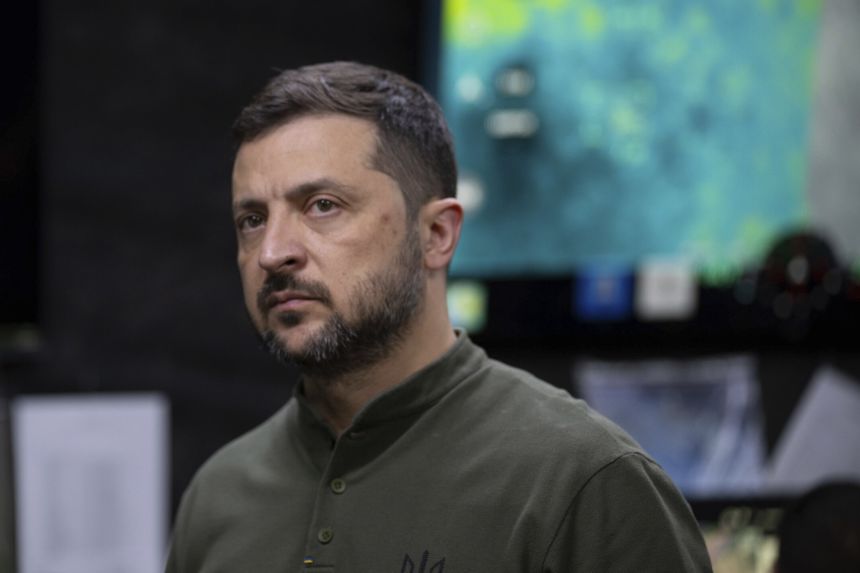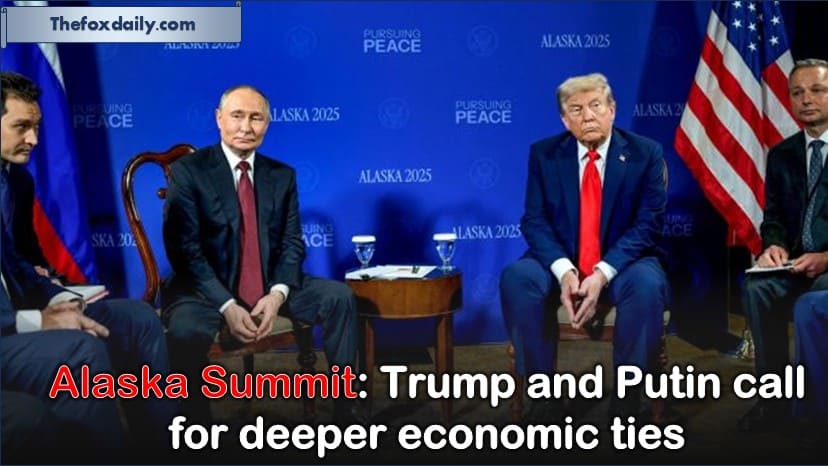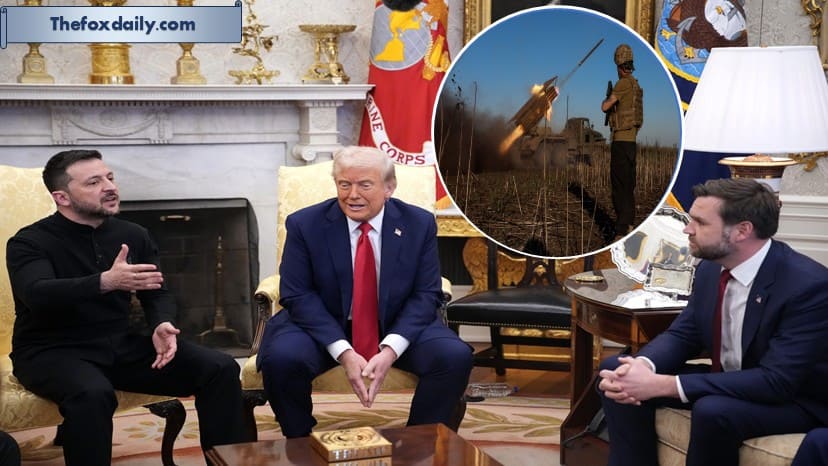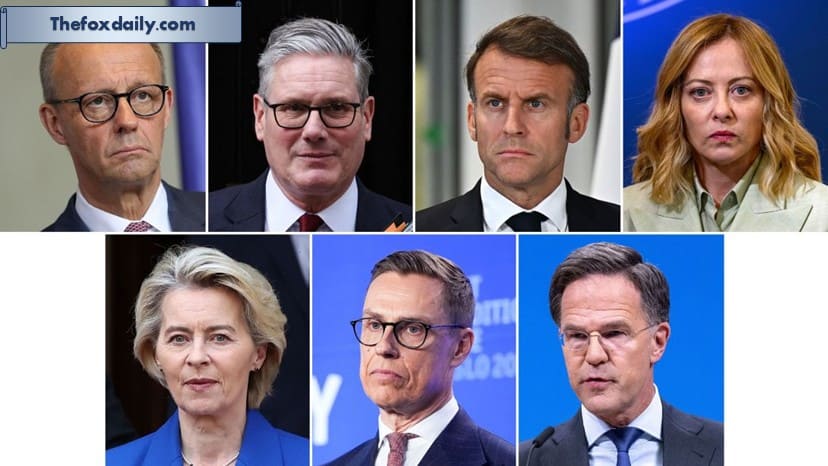
Two days after meeting with President Vladimir Putin, President Donald Trump is increasing pressure on Ukraine to accept agreements to end the war with Russia, reiterating some of Moscow’s talking points.
In the most crucial step yet in a growing drive to put a stop to the bloody conflict that followed Russia’s 2022 invasion, Trump will convene a conference with Ukrainian President Volodymyr Zelensky on Monday, accompanied by a phalanx of European leaders.
The White House meeting will put Trump’s sincerity and ability to guide Russia and Ukraine toward an exit ramp that is unlikely to appease either party to the test. It is also one of the most important days for European security and the Western alliance since the end of the Cold War.
It comes after Trump’s session with Putin in Alaska on Friday, which was generally seen with dismay by those outside the government and MAGA community. The US president greeted his war crime-accused visitor with cheers. In exchange for a few public initiatives, Trump made a number of significant symbolic and procedural concessions to Putin.
However, Steve Witkoff, Trump’s envoy, argued on CNN on Sunday that Russia had loosened its stance on post-war Western security arrangements for Ukraine and was willing to make large territorial exchanges in any agreement to put an end to the conflict.
“We agreed to robust security guarantees that I would describe as game-changing,” Witkoff told Jake Tapper on “State of the Union.”
The White House discussions on Monday will be influenced by varying opinions about the Trump summit.
Putin demanded that Ukraine cede large areas of the vital strategic and economic hub of Donbas, which his forces have been unable to capture in three and a half years of conflict, European officials privately told CNN. This would be all but impossible for Zelensky to accept — politically, constitutionally, economically and strategically. While protecting communities and farmland that are thought to be a barrier against future Russian attack, his forces have incurred significant casualties.
What actually transpired in Alaska is unknown to anyone outside of the US and Russian delegations. Furthermore, it is important to hold important talks before judging the president’s call for European leaders and his vigorous pursuit of peace.
Trump insisted on social media Sunday that “great progress” was being made.
But hanging over Monday’s White House meetings is his warning to Ukraine after the summit with Putin.
“Make a deal,” Trump said on Fox News. “They’re not, and Russia is a very powerful nation.”
In a post on Truth Social on Sunday night, the president increased pressure on the Ukrainian leader and reiterated Russia’s position that Zelensky’s nation can never join NATO. “President Zelensky of Ukraine can end the war with Russia almost immediately, if he wants to, or he can continue to fight,” Trump wrote.

This sparked fears in Kyiv and other European capitals that Trump would attempt to force Zelensky to accept Putin’s ideal peace proposal and that he would blame Kyiv and withdraw from the conflict completely if the Ukrainian leader rejected this impractical option.
This highlights an important element in Monday’s White House meeting, which might become a remarkable, televised spectacle if the president allows the cameras to record a significant chunk of it. His guests need to be ready for this eventuality.
Is Trump willing to serve as a mediator who will persuade Russia and Ukraine and its allies in Europe to make difficult compromises in spite of their acrimonious animosity? Or does Trump’s acceptance of Putin’s opposition to an immediate ceasefire and postponement of tough new US sanctions on Moscow mean the US will now side with Russia against Ukraine and Europe?
Josh Rudolph, managing director and senior fellow of strategic democracy initiatives at the German Marshall Fund, said, “Trump has done something useful in his drive to end the war: Negotiations have shown the world that Putin — not the Ukrainians or Europeans — is the one who is unwilling to stop fighting without conditions like handing over more land than he has already illegally conquered.”
“The question is now which side America is on.”
Despite suspicions about his intentions, Trump is an important participant.
The US president is still the possible spark for any peace agreement, even in light of the backlash against the Alaska summit and Trump’s sympathy for Putin. The Russian leader shows no signs of wanting peace, but if US pressure is applied effectively, it might be the one thing that prevents him from going to war.
Furthermore, even though Europe will be crucial to Ukraine’s security following any agreement, it has no clout with Putin and cannot carry out a pledged peace enforcement mission without Trump’s backing.
It is useless to speculate in the Washington bubble about whether Trump is attempting to hasten the end of the war in Ukraine in order to win a Nobel Peace Prize in this situation. Who cares about his intentions if he can somehow settle the dispute amicably?
Unfavorable memories of the Oval Office
Trump may even satisfy his desire for the award that his first president, Barack Obama, received if Europe is safe. He might still be excluded from the Nobel Committee’s consideration, though, because of US assistance for Israel as it approaches complete occupation of Gaza in the face of famine.
Zelensky’s entrance will bring up memories of his catastrophic February visit to the Oval Office.
His escort from the presidents of France, Germany, Britain, Italy, Finland, NATO, and the European Commission is viewed as a protection squad after shocking live footage showed Trump and Vice President JD Vance scolding the Ukrainian leader.
However, Zelensky’s reputation is not the only thing at risk for Europe.
The greatest geopolitical threat to Europe since the collapse of the Soviet Union is the potential for Russia to prevail in Ukraine and be vindicated for its unlawful invasion.
“This is crucial for the security of Europe as well. Fiona Hill, a Russia specialist during Trump’s first term, stated on Sunday on CBS’ “Face the Nation” that “minimizing the role of Europe here, be it the United Kingdom, be it Poland, be it Finland, be it France, be it Germany, is not the way to go.”

Hill stated, “Europe must have an equal voice in all of this.” “This is not just about Ukraine’s security; it is about Europe’s and European security’s future.”
Even if the administration is pushing for a three-way conference between Trump, Putin, and Zelensky—possibly as early as this week—it will be challenging to generate momentum for real peacemaking.
Nicholas Dungan, a senior member of the European Leadership Network, stated, “The challenge is to try to achieve alignment between what look like very disparate things — what Trump wants, what the Europeans want, and what Putin wants.” “A sovereign Ukraine is what the Europeans desire.” Trump desires a peace agreement. Dungan, who is also the CEO of the strategic advising business CogitoPraxis, stated that these are not the same thing.
Ukraine and its European allies might not be able to accept what Putin wants.
Alongside Trump, the Russian leader set conditions in Alaska, calling for focus on the war’s “root causes.” This is an abbreviation for a number of things, such as the removal of Zelensky, significant military cuts to Ukraine that would make it harder for Kyiv to fend off any future invasion, and the reallocation of NATO forces from Moscow’s former Soviet orbit in Eastern Europe.
This discrepancy explains why Trump’s national security adviser and secretary of state, Marco Rubio, is more pessimistic than Witkoff or the US president.
Rubio stated on ABC that “there are still some significant areas of disagreement, but we made progress in that we identified potential areas of agreement.” We have a long way to go. I mean, we are not on the verge of a peace deal, nor are we on the brink of one.
Trump’s disposition will be crucial.
German Chancellor Friedrich Merz, Italian Prime Minister Giorgia Meloni, British Prime Minister Keir Starmer, Finnish President Alexander Stubb, NATO Secretary General Mark Rutte, European Council President Ursula von der Leyen, and French President Emmanuel Macron are among the European leaders visiting the White House.
Trump has good personal relationships with several of them, especially Meloni; Stubb, a golf partner; and Starmer. Rutte is seen as something of a Trump whisperer.
But the president’s mood will be crucial, especially after critical media coverage of his lavish welcome for Putin.
The influence of Europe is also under doubt. Trump stated that he would be unhappy if he failed to obtain a ceasefire in Alaska, echoing the European view that such a ceasefire is an essential first step in peacemaking. However, he supported Russia’s position that a drive for a comprehensive peace agreement is the best course of action after meeting with Putin. Russia benefited from this since a complete settlement may take months to reach and would provide its forces more time to occupy additional territory while carrying out attacks on people.
Compared to the White House, Europe is much less convinced that any commitments Putin made to Trump on Friday are sincere.

Macron wrote on X on Saturday that it will be “essential to draw all the lessons from the past 30 years, in particular from Russia’s well-established tendency not to honor its own commitments.”
However, Witkoff said it was encouraging that Trump agreed to Putin’s ceasefire sequencing.
Witkoff told CNN’s Tapper, “at this meeting, we made so much progress with regard to all the other ingredients necessary for a peace deal that we, that President Trump, pivoted to that place.”
While in Alaska, the Russian president attempted to divide the allies. “We anticipate that Kyiv and European capitals will view (the negotiations) favorably and that they won’t interfere; they won’t try to use some backroom deals to conduct provocations to destroy the early progress,” Putin stated.
In response to Trump’s detractors, Witkoff said that Putin had agreed to a security guarantee between Ukraine, the US, and European nations that was comparable to NATO’s Article 5 provision that states that an attack on one is an assault on all. However, there would be no connection whatsoever between this endeavor with NATO.
Putin had made “concessions on several of the regions,” he added to CNN, though he would not specify what they were. Furthermore, the Kremlin has not confirmed anything.
But in return for an Anchorage welcome that purged his international pariah status, Putin offered political gifts to Trump. These included support for Trump’s assertion that the Russians would not have invaded Ukraine if he had been in power, as well as a reiteration of the president’s unfounded accusations that mail-in voting is not democratic.
It’s also a little odd that the US is so optimistic about an Article 5-style assurance given that Putin would expect extraordinary measures in exchange. Furthermore, if Russia attacked one of NATO’s members along its borders, possibly in the Baltic states, there are already worries that Trump would violate the alliance’s mutual defense pact. It seems ludicrous that he would risk conflict with Russia in order to help Ukraine.
This might also put Trump at odds with his political base, which shares his doubts about America’s protection of European allies and his desire to avoid more foreign wars.
Zelensky has already been portrayed by a number of prominent MAGA-friendly websites as a barrier to peace and the hindrance to yet another Trump “win,” as part of the conservative media’s weekend-long interference on Trump’s behalf.
But the imagery of Trump as a peacemaker is a powerful one among his most loyal supporters.
For breaking news and live news updates, like us on Facebook or follow us on Twitter and Instagram. Read more on Latest World on thefoxdaily.com.





COMMENTS 0